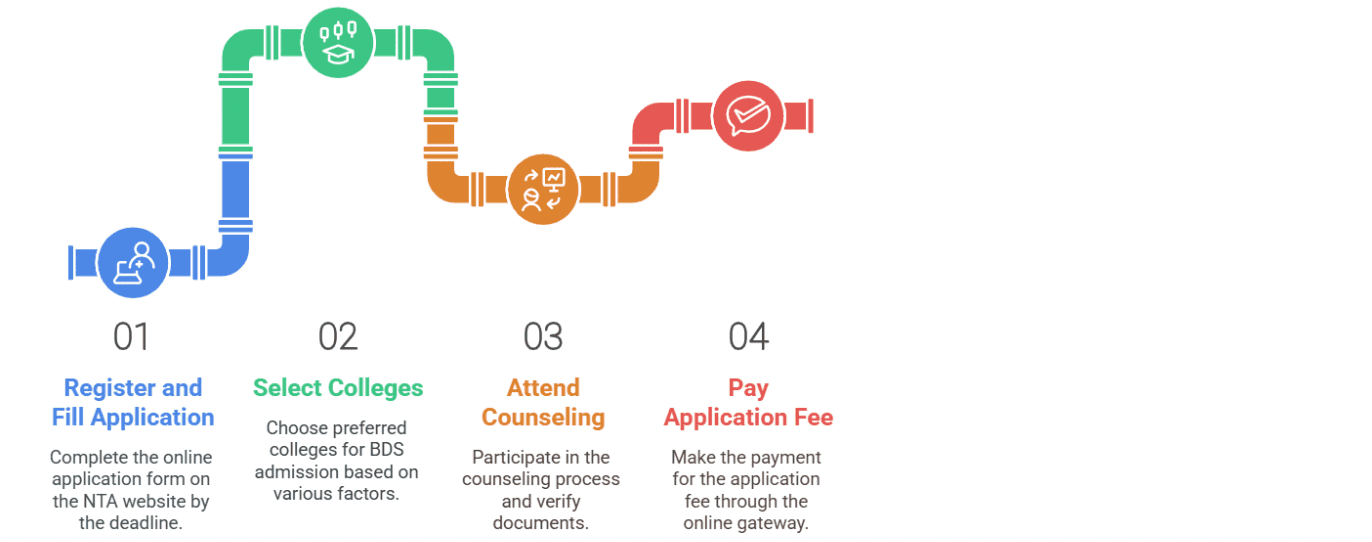Explore Courses
Top University

Komal
27 February, 2025
Table of Contents
‘She laughs at everything you say. Why? Because she has fine teeth.’ – Benjamin Franklin
Do not underestimate the power of a dentist and their art of giving you a perfect smile you can flaunt anytime. Are you planning to become the next dental expert? If you want to pursue a career where you are passionate about healthcare and provide hands-on precision, a Bachelor of Dental Surgery (BDS) is a great career option.
Dentistry as a degree is one of the most fulfilling and impactful careers in the present industry. Moreover, it is one of the most respected and prestigious medical fields. So, if you are interested in pursuing a BDS course, we have the perfect guide. Join us as we explore the BDS course in depth. This blog would cover different career options, full form, colleges, courses, ranking, and syllabus.
BDS stands for Bachelor of Dental Surgery. It is a five-year degree course that prepares you to become a dentist. This medical course provides full-time classes with hands-on training. It aims to train you for the role of a dental surgeon, where you can diagnose, treat, and prevent various oral health issues. The BDS course covers dental anatomy, physiology, biochemistry, pharmacology, oral pathology, microbiology, dental materials, and clinical dentistry.
The BDS course covers dental anatomy, physiology, biochemistry, pharmacology, oral pathology, microbiology, dental materials, and clinical dentistry. The BDS course is fully equipped to train you to perform dental surgery in future.
There are many reasons why BDS has always been a respected profession. However, it gained popularity these days given its professional perks. Some of the few reasons why BDS gained significance are:
BDS comes along with opportunities and a handful of skills. The BDS undergraduate programme has different specialisations and courses covered within the 5 years programme. Some of the common courses are:
Once you select the BDS programme, you would be covering some of the important core subjects. These subjects are common among different universities and colleges. This list contains some of the key subjects:
The admission process for the BDS programme can be complicated to understand. However, we have prepared an easy stepwise guide for the admission process:
The admission process for Bachelor of Dental Surgery (BDS) programmes in India follows a structured procedure to select eligible candidates for pursuing a career in dentistry. Here’s an overview of the admission process:
To be able to apply for the mandatory NEET Entrance Exam, the eligibility criteria are as follows:
You need to register and fill out the NEET UG application form online on the official NTA website by the specified deadline.
You should carefully select the colleges where you wish to apply for BDS admission, considering factors like ranking, reputation, location, and facilities.
Appear for the counselling process and for document verification.
After completing the application form, make sure to pay the requisite application fee online through the provided payment gateway.

If you qualify based on your NEET UG scores, you become eligible to participate in counselling necessary for seat allotment. Seats in BDS colleges are allotted based on your NEET UG ranks, preferences, category, and seat availability.
Here are some of the top BDA colleges in India and their fees in INR:
| College Name | Total Academic Fees (INR) |
|---|---|
| Saveetha Institute of Medical and Technical Sciences | INR 43,00,000 |
| Manipal College of Dental Sciences, Manipal | INR 34,60,000 |
| Maulana Azad Institute of Dental Sciences, New Delhi | NA |
| Faculty of Dental Sciences, King George’s Medical University, Lucknow | NA |
| SRM Dental College, Chennai | INR 22,00,000 |
| Amrita Vishwa Vidyapeetham | INR 17,50,000 |
Here is the list of the top entrance exams and their expected dates:
| Exam Name | Dates |
|---|---|
| NEET UG | 4 May 2025 (tentative as per the exam trends) |
| Indraprastha University Common Entrance Test (IPU CET) | April – May 2nd week, 2025 (exact date is awaited) |
| BCECE | Last week of July 2025 (tentative) |
If you are confused between so many choices and you want to know how to pick the right college here is your guide:
The number of options after a BDS degree is endless. You can opt for different career paths or continue with a master’s in dental surgery. Here are some of the top career opportunities with salaries/stipends.
| Career Options | Salary/Stipend |
|---|---|
| Master’s in Dental Surgery | INR 30,000 per month – INR 80,000 per month |
| Public Health Expert | INR 4.8 LPA – INR 12.0 LPA |
| Business Administration in Healthcare | INR 5.0 LPA – INR 20.0 LPA |
| Academic Instructor | INR 1.8 LPA – INR 4.8 LPA |
| Private Dental Practice | Unlimited |
| Government Dentistry Positions | INR 8.0 LPA – INR 9.0 LPA |
| Dental Researcher | INR 7.0 LPA – INR 22.0 LPA |
| Cosmetic Dentistry | INR 4.0 LPA |
| Dental Content Creation | INR 30,000 per month – INR 45,000 per month |
| Forensic Odontologist | INR 7.0 LPA – INR 7.5 LPA |
| Medical Transcriptionist | INR 1.8 LPA – INR 3.0 LPA |
| Dental Consulting | INR 1.4 LPA – INR 4.6 LPA |
| Dental Insurance Specialist | INR 2.1 LPA – INR 16.4 LPA |
BDS is one of the most secure professions for students who wish to work in healthcare. BDS, or Bachelor of Dental Surgery, is a 5-year undergraduate programme you can pursue after achieving the cut-off marks for an academic year in the NEET UG exam. It has become popular due to the demand for dental durians in the job market, clinics, and hospitals. You would have a variety of options and opportunities after you complete the BDS course. This course would enhance your practical and theoretical skills in the field. So, if you want to become the next top dental doctor with a private clinic or work in a hospital, this is the right course for you. Get your seat now!
Our team of experts, or experienced individuals, will answer it over online meet. Book your slot now!
Book Free Online CounsellingGet Free Career Guidance
